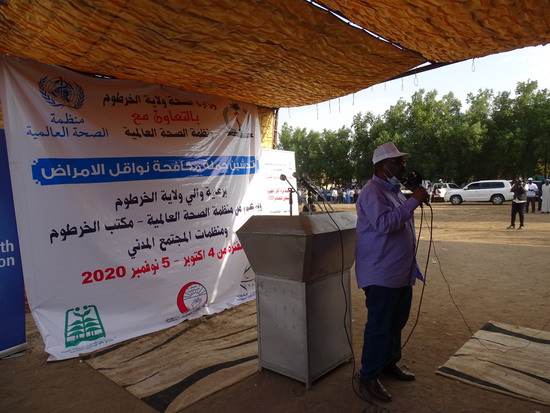
5 October 2020 – This year’s heavy rains caused the worst floods in Sudan since decades. As of the 9 September, more than 860 000 people have been critically affected and more than 181 000 houses have been damaged or destroyed and thousands of people are left homeless.
Heavy rains and floods have also increased mosquito-borne diseases, malaria in particular as prolonged rains increase the amount of stagnant water in the environment in which mosquitoes breed.
To effectively reduce the sources of vectors and reduce potential impacts of vector borne diseases, the WHO is supporting the Ministry of Health conduct a community-based vector control campaign. The campaign was officially launched on 3 October 2020 with the presence of the Wali of Khartoum State, the Director General of the State Ministry of Health, the WHO Representative in Sudan and other partners. This campaign will be divided into 2 phases, the first phase will last over a period of one month with intensified activities to reach as many people as possible across all 7 localities of Khartoum State, followed by a second phase of 2 months during which activities will continue at the high-risk localities based on the vector analysis and monitoring results.
WHO and the Khartoum State Ministry of Health and partners have mobilized more than 1200 workers and supervisors to implement the campaign activities which mainly focus on the elimination of mosquito and vector breeding sites through internal and external spraying of neighbourhoods and source management for immature phases with special focus on those most affected by the rain and where malaria rates are increasing.
In addition to the spraying campaigns, WHO is also supporting activities to build the capacity of locality staff on vector surveillance, inspection and reporting, the implementation of vector surveillance to monitor mosquito density and finally, larval source management and larva surveillance. WHO will also support community engagement and health promotion activities to raise awareness and build understanding among the community.
‘’WHO adopts vector control as part of its strategy to reduce infection rates and the spread of vector-borne diseases in the community. It is necessary to refer to the role of the community in addition to the efforts made by the State Ministry of Health with support from WHO in combating these vectors by reducing breeding sites, especially at this critical time where heavy rains and floods have affected more than 830 000 people in the country. It is our joint responsibility to combat such diseases, provide the right treatment, upgrade Sudan’s health system, and improve basic health care services to build resilient communities,’’ said Dr Ni’ma Saeed Abid, WHO Representative in Sudan.
The main objective of the campaign is that by its end, there will be a considerable decrease in malaria and other vector-borne diseases, in addition to stronger community engagement in adopting preventive and protective measures to decrease the likelihood of the regeneration of mosquito and other vector breeding sites.





